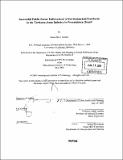Successful public sector enforcement of environmental standards in the Toritama Jeans industry in Pernambuco, Brazil
Author(s)
Lazarte, Maria Ella J
DownloadFull printable version (7.091Mb)
Other Contributors
Massachusetts Institute of Technology. Dept. of Urban Studies and Planning.
Advisor
Judith Tendler.
Terms of use
Metadata
Show full item recordAbstract
Non-observance of environmental standards among small firms in traditional industries such as garment, footwear, furniture and tanneries have caused major environmental degradation in many places throughout the world. Because these firms provide significant employment and income in poor regions and often work under financial and technical constraints, the public sector and donors alike often exempt them from environmental, tax, and labor legislation. I chose to study a case in which the outcome was different, in which small firms in a highly informal garment industry to improve environmental conditions. This paper explores why and how did public agencies begin to enforce environmental and worker safety standards in 2001 among small firms that have largely been exempted from such standards for many years? I argue that: 1.) the local residents' complaints to both the Public Ministry and CPRH aligned with these two agencies' current interests of actively enforcing environmental legislation throughout the state of Pernambuco; 2.) the Public Ministry bolstered CPRH's presence through legal pressure using the Terms of Conduct Adjustment (TAC) to elicit firm support and compliance and CPRH provided important technical assistance; and lastly 3.) the Public Ministry and CPRH elicited key support from the private sector to convince other firms by working with one of the largest firms and offering financial and technical assistance to help firms comply with rigid requirements.
Description
Thesis (M.C.P.)--Massachusetts Institute of Technology, Dept. of Urban Studies and Planning, 2005. Includes bibliographical references (p. 65-68).
Date issued
2005Department
Massachusetts Institute of Technology. Department of Urban Studies and PlanningPublisher
Massachusetts Institute of Technology
Keywords
Urban Studies and Planning.